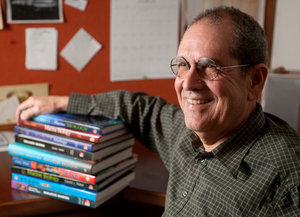From conducting research in France to serving as the associate editor of a scientific journal to updating his successful marine biology textbook, Peter Castro, professor emeritus of biological sciences, has had a very busy retirement. Since he stepped down from full-time teaching in 2003, Castro has been as active - perhaps more so - in research and writing.
He frequently travels internationally to present his findings, further his research or serve as a visiting scholar. In March, he spoke at a conference in Brazil on the symbiotic relationship between crabs and reef corals. This spring, he is in Paris working on deep-water crabs recently collected in Madagascar, New Guinea and French Polynesia.
"I don't think of myself as 'retired,' just not having to drive to Cal Poly Pomona every day!" he says.
Castro's marine biology research began in his undergraduate years, inspired by his mentor at the University of Puerto Rico. It's a passion that Castro still hopes to pass on to a younger generation of students.
"He was very enthusiastic, very smart," Castro says of Professor Peter Glynn, a well-known marine ecology expert now on the faculty at the University of Miami. "He was very strict and detailed in his research and writing scientific papers. He influenced me a great deal."
Like his mentor, Castro sets a high bar for excellence.
"Good students who appreciate a hard professor loved him and understood the value of the high standards that Dr. Castro set for them," says Sepehr Eskandari, chair of the Department of Biological Sciences at Cal Poly Pomona. "He is a true scholar. He has devoted his entire life to his scholarship and his field. Few people have the passion, desire and will-power to do the same." Eskandari adds that even in retirement, Castro has remained a very prolific scholar.
In order to inspire environmentally conscious students to pursue research projects that benefit the natural world, Castro recently signed a $1.5 million bequest - the largest gift to the College of Science - to endow two scholarships, as well as establish an environmental science scholar-in-residence.
The bequest comes a few months after a generous $147,000 donation Castro made to establish the scholarships. The Rachel Carson Environmental Science Scholarship, named after the American biologist and conservationist who started the modern environmental movement, provides $10,000 per year to support undergraduate or graduate student research. The Honors Scholarship for the Study of the Environment provides $10,000 per year to an incoming freshman or transfer student in the Kellogg Honors College whose studies serve as a pathway for a career in the preservation and enhancement of the natural environment.
"Science is research. To be a scientist you really must be actively involved in doing hands-on research," Castro says. "That's the way I started. It opens a view of the world and gives you experiences."
The scholar-in-residence program will bring in visiting faculty for teaching and research. "To have somebody come from another country would be a very prestigious thing for Cal Poly Pomona," Castro says. "Some of the large universities - UCLA and USC - normally receive many scholars-in-residence."
Castro's bequest sets a historic precedent for the biological sciences department, Eskandari says, enabling the department to attract internationally known experts who would enrich the educational experience of students interested in the environmental sciences, as well as further enhance the intellectual life of the department. "We indeed owe him a great deal of gratitude," he says.
Born and raised in Puerto Rico, Castro says a high school field trip to a marine lab sparked his interest in marine biology. He completed his undergraduate education at the University of Puerto Rico, Mayaguez, and pursued master's and doctoral degrees in marine zoology at the University of Hawaii. His tenure at Cal Poly Pomona began in 1972. In addition to publishing 52 scientific papers, Castro has served as a visiting scholar and researcher in Spain, Italy, Australia, France, and Ukraine, where he was a Fulbright Scholar at Odessa State University. He also holds a bachelor's in history with a minor in art history from Cal Poly Pomona, which he obtained in 1992.
One of Castro's most notable achievements is co-authoring the textbook "Marine Biology," a comprehensive overview of marine ecosystems, animals, plants and human impact. Widely used at the college level, the textbook is in its eighth edition has been translated into Chinese, Italian, Spanish, Greek and soon in Korean and Portuguese.
Updating the book is a full-time job, and Castro is working on the ninth edition. He keeps tabs on current events, new developments and research. For example, Castro clipped a recent article about the unprecedented number of sea otter deaths along the California coast in 2011.
"I had to change the manuscript [of the ninth edition] to add this," Castro says. "I have to constantly be aware of new things, new developments and discoveries. It's a lot of work, but I really love it."

Cal Poly Pomona has embarked on a $150 million comprehensive fundraising campaign to ensure that a quality college education is within reach for future generations of students. The campaign, which recently surpassed $100 million in donations and pledges, will strengthen the university's ability to provide a hands-on education, to prepare students for the changing demands of the workplace, and to increase research and scholarship opportunities. The fundraising campaign relies on the support of the entire campus community - from alumni to faculty and staff to friends of the university. For more information, visit https://campaign.cpp.edu/.


